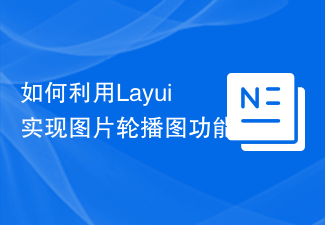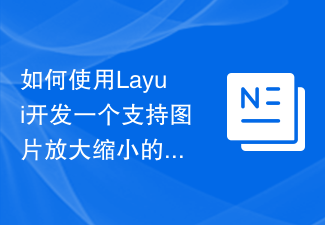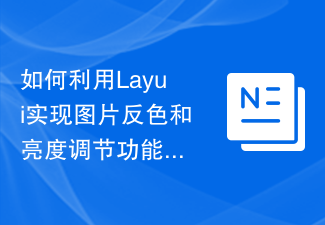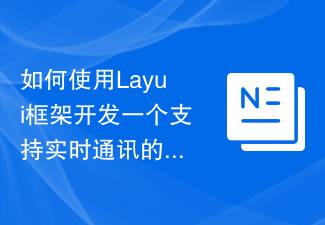 Web Front-end
Web Front-end JS Tutorial
JS Tutorial How to use Layui to develop a social platform that supports online gathering activities
How to use Layui to develop a social platform that supports online gathering activities
How to use Layui to develop a social platform that supports online party activities
In recent years, with the rise of social networks, people have become more and more interested in the semi-virtual world Communicate and share your life with others. Among them, online gatherings have become a popular way of socializing around the world. In order to meet the needs of users, we can use the Layui framework to develop a social platform that supports online gathering activities.
First, we need to build a basic web page framework. Layui provides a simple and easy-to-use front-end UI framework that can help us quickly build web pages. The following is a simple HTML code example:
<!DOCTYPE html>
<html lang="en">
<head>
<meta charset="UTF-8">
<title>在线聚会社交平台</title>
<link rel="stylesheet" href="https://cdn.jsdelivr.net/npm/layui@2.5.6/dist/css/layui.css">
</head>
<body>
<div class="layui-container">
<h1 id="在线聚会社交平台">在线聚会社交平台</h1>
<div class="layui-row layui-col-space15">
<!-- 在这里添加聚会活动的列表 -->
</div>
</div>
<script src="https://cdn.jsdelivr.net/npm/jquery@3.5.1/dist/jquery.min.js"></script>
<script src="https://cdn.jsdelivr.net/npm/layui@2.5.6/dist/layui.js"></script>
</body>
</html>Next, we can use Layui's components to implement the core functions of the social platform. For example, we can add a list of party events to display party events that have been published. The following is a code example implemented using Layui's card component:
<!-- 在这里添加聚会活动的列表 -->
<div class="layui-col-md4">
<div class="layui-card">
<div class="layui-card-header">聚会标题</div>
<div class="layui-card-body">
<p>聚会时间:2021年1月1日 下午2点</p>
<p>聚会地点:某某酒吧</p>
<button class="layui-btn layui-btn-normal">报名参加</button>
</div>
</div>
</div>In addition to displaying party activities, we also need to implement the function for users to sign up for parties. You can use Layui's button component to trigger the corresponding event when the user clicks the "Sign Up" button. The following is a sample code that binds a click event:
<!-- 在这里添加聚会活动的列表 -->
<div class="layui-col-md4">
<div class="layui-card">
<div class="layui-card-header">聚会标题</div>
<div class="layui-card-body">
<p>聚会时间:2021年1月1日 下午2点</p>
<p>聚会地点:某某酒吧</p>
<button class="layui-btn layui-btn-normal" onclick="joinParty()">报名参加</button>
</div>
</div>
</div>
<script>
function joinParty() {
// 在这里处理用户报名参加聚会的逻辑
// ...
}
</script>When the user clicks the "Sign Up" button, the registration information can be sent to the server through an Ajax request, and the corresponding UI can be updated.
In addition to the display and registration functions of party events, we can also consider implementing other functions, such as user registration and login, creating party events, searching party events, etc. The implementation of these functions is similar to the above and can be accomplished with the help of Layui components.
To sum up, it is feasible and simple to use Layui to develop a social platform that supports online gathering activities. Through the components and styles provided by Layui, we can quickly build a social platform with basic functions. Of course, the specific implementation needs to be adjusted and improved according to project needs, but Layui's simplicity and ease of use will definitely save developers a lot of time and energy. Hope this article can be helpful to you.
The above is the detailed content of How to use Layui to develop a social platform that supports online gathering activities. For more information, please follow other related articles on the PHP Chinese website!
 2023最新layui视频教程推荐(建议收藏)Jul 19, 2021 pm 05:22 PM
2023最新layui视频教程推荐(建议收藏)Jul 19, 2021 pm 05:22 PM以下为大家整理了前端UI框架 — layui的视频教程,不需要从迅雷、百度云之类的第三方网盘平台下载,全部在线免费观看。教程由浅入深,有前端基础的人就能学习,从安装到案例讲解,全面详细,帮助你更快更好的掌握layui框架!
 如何利用Layui实现图片轮播图功能Oct 24, 2023 am 08:27 AM
如何利用Layui实现图片轮播图功能Oct 24, 2023 am 08:27 AM如何利用Layui实现图片轮播图功能现如今,图片轮播图已经成为了网页设计中常见的元素之一。它可以使网页更加生动活泼,吸引用户的眼球,提升用户体验。在本文中,我们将介绍如何利用Layui框架来实现一个简单的图片轮播图功能。首先,我们需要在HTML页面中引入Layui的核心文件和样式文件:<linkrel="stylesheet"h
 如何利用Layui实现图片拖拽和缩放效果Oct 24, 2023 am 09:16 AM
如何利用Layui实现图片拖拽和缩放效果Oct 24, 2023 am 09:16 AM如何利用Layui实现图片拖拽和缩放效果在现代网页设计中,图片的交互效果成为增加网页活力和用户体验的重要手段。其中,图片拖拽和缩放效果是常见且受欢迎的交互方式之一。本文将介绍如何使用Layui框架实现图片拖拽和缩放效果,并提供具体的代码示例。一、引入Layui框架和相关依赖:首先,我们需要在HTML文件中引入Layui框架和相关依赖。可以通过以下代码示例引入
 如何利用Layui开发一个具有分页功能的数据展示页面Oct 24, 2023 pm 01:10 PM
如何利用Layui开发一个具有分页功能的数据展示页面Oct 24, 2023 pm 01:10 PM如何利用Layui开发一个具有分页功能的数据展示页面Layui是一个轻量级的前端UI框架,提供了简洁美观的界面组件和丰富的交互体验。在开发中,我们经常会遇到需要展示大量数据并进行分页的情况。以下是一个利用Layui开发的具有分页功能的数据展示页面的示例。首先,我们需要引入Layui的相关文件和依赖。在html页面的<head>标签中加入以下代
 如何使用Layui开发一个支持图片放大缩小的相册功能Oct 24, 2023 am 09:02 AM
如何使用Layui开发一个支持图片放大缩小的相册功能Oct 24, 2023 am 09:02 AM如何使用Layui开发一个支持图片放大缩小的相册功能相册功能在现代的网页应用中非常常见,通过展示用户上传的图片,让用户能够方便地浏览和管理图片。为了提供更好的用户体验,一种常见的需求是支持图片的放大和缩小功能。本文章将介绍如何使用Layui框架开发一个支持图片放大缩小的相册功能,同时提供具体的代码示例。首先,确保您已经引入Layui框架的CSS和JS文件。您
 如何利用Layui实现图片反色和亮度调节功能Oct 25, 2023 am 09:10 AM
如何利用Layui实现图片反色和亮度调节功能Oct 25, 2023 am 09:10 AM如何利用Layui实现图片反色和亮度调节功能引言:在前端开发中,经常会遇到需要对图片进行特效处理的情况。本文将介绍如何利用Layui框架实现图片反色和亮度调节功能,并提供具体代码实例供参考。一、Layui简介:Layui是一款优秀的前端UI框架,具有简洁、美观、易用等特点。它提供了丰富的前端组件,让开发者能够轻松搭建出精美的网站。二、准备工作:在开始之前,我
 如何使用Layui开发一个支持文件上传和下载的资源管理系统Oct 24, 2023 am 09:19 AM
如何使用Layui开发一个支持文件上传和下载的资源管理系统Oct 24, 2023 am 09:19 AM如何使用Layui开发一个支持文件上传和下载的资源管理系统引言:随着互联网的发展,数据资源的管理已经成为一项重要的任务。无论是企业内部的文档管理,还是个人的文件存储,都需要一个高效且易于使用的资源管理系统。Layui是一款轻量级的前端框架,具有简洁明了的设计以及丰富的组件库,非常适合用来进行资源管理系统的开发。本文将介绍如何使用Layui开发一个支持文
 如何使用Layui框架开发一个支持实时通讯的在线客服系统Oct 25, 2023 am 08:47 AM
如何使用Layui框架开发一个支持实时通讯的在线客服系统Oct 25, 2023 am 08:47 AM如何使用Layui框架开发一个支持实时通讯的在线客服系统概述:在线客服系统是现代企业提供与客户交流的重要渠道之一,而实时通讯是在线客服系统的关键技术之一。本文将介绍如何使用Layui框架开发一个支持实时通讯的在线客服系统,并提供具体的代码示例。一、准备工作安装Node.js:在开发环境中安装Node.js,并配置好相关环境。安装Layui:在项目中引入Lay


Hot AI Tools

Undresser.AI Undress
AI-powered app for creating realistic nude photos

AI Clothes Remover
Online AI tool for removing clothes from photos.

Undress AI Tool
Undress images for free

Clothoff.io
AI clothes remover

AI Hentai Generator
Generate AI Hentai for free.

Hot Article

Hot Tools

EditPlus Chinese cracked version
Small size, syntax highlighting, does not support code prompt function

MantisBT
Mantis is an easy-to-deploy web-based defect tracking tool designed to aid in product defect tracking. It requires PHP, MySQL and a web server. Check out our demo and hosting services.

Safe Exam Browser
Safe Exam Browser is a secure browser environment for taking online exams securely. This software turns any computer into a secure workstation. It controls access to any utility and prevents students from using unauthorized resources.

Dreamweaver CS6
Visual web development tools

PhpStorm Mac version
The latest (2018.2.1) professional PHP integrated development tool






